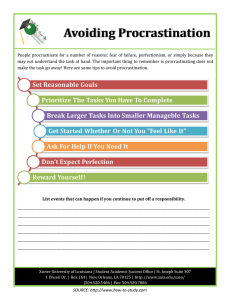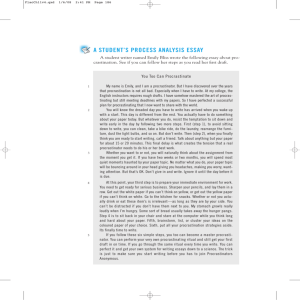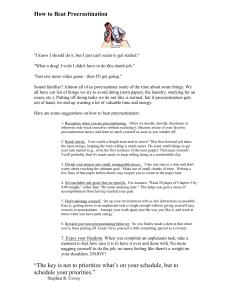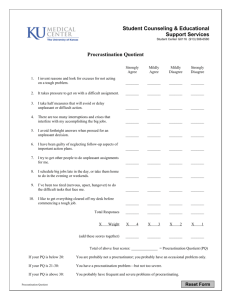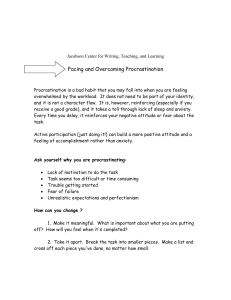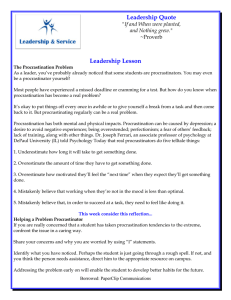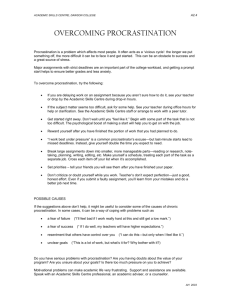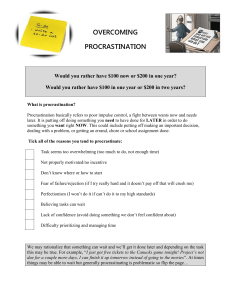Document 14463357
advertisement
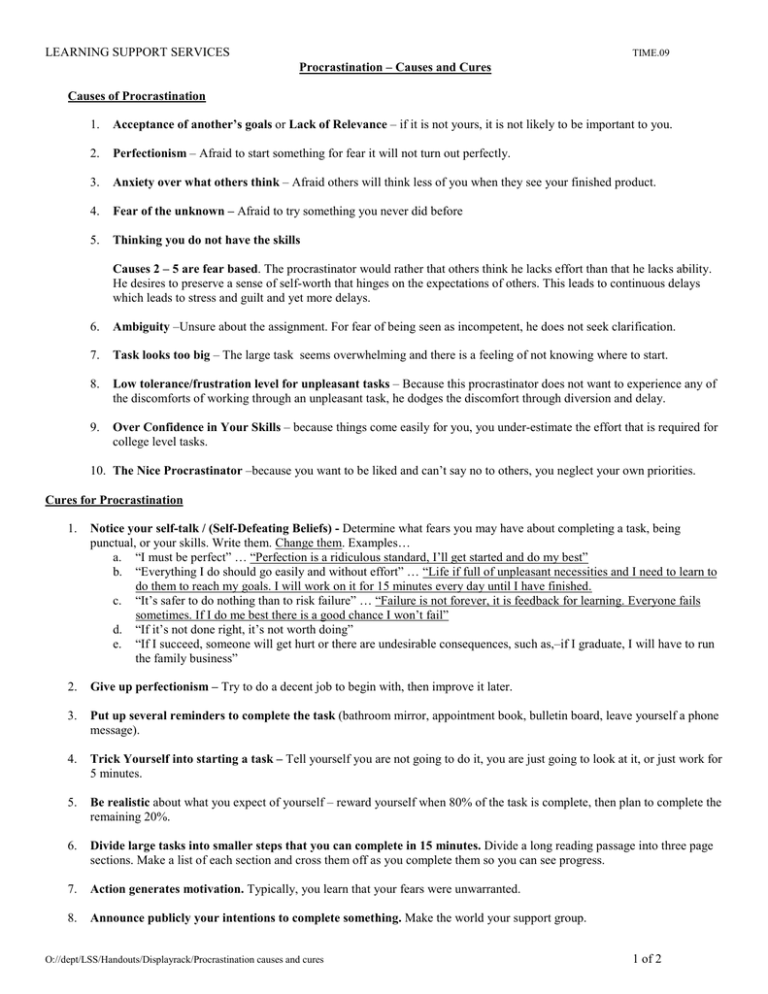
LEARNING SUPPORT SERVICES TIME.09 Procrastination – Causes and Cures Causes of Procrastination 1. Acceptance of another’s goals or Lack of Relevance – if it is not yours, it is not likely to be important to you. 2. Perfectionism – Afraid to start something for fear it will not turn out perfectly. 3. Anxiety over what others think – Afraid others will think less of you when they see your finished product. 4. Fear of the unknown – Afraid to try something you never did before 5. Thinking you do not have the skills Causes 2 – 5 are fear based. The procrastinator would rather that others think he lacks effort than that he lacks ability. He desires to preserve a sense of self-worth that hinges on the expectations of others. This leads to continuous delays which leads to stress and guilt and yet more delays. 6. Ambiguity –Unsure about the assignment. For fear of being seen as incompetent, he does not seek clarification. 7. Task looks too big – The large task seems overwhelming and there is a feeling of not knowing where to start. 8. Low tolerance/frustration level for unpleasant tasks – Because this procrastinator does not want to experience any of the discomforts of working through an unpleasant task, he dodges the discomfort through diversion and delay. 9. Over Confidence in Your Skills – because things come easily for you, you under-estimate the effort that is required for college level tasks. 10. The Nice Procrastinator –because you want to be liked and can’t say no to others, you neglect your own priorities. Cures for Procrastination 1. Notice your self-talk / (Self-Defeating Beliefs) - Determine what fears you may have about completing a task, being punctual, or your skills. Write them. Change them. Examples… a. “I must be perfect” … “Perfection is a ridiculous standard, I’ll get started and do my best” b. “Everything I do should go easily and without effort” … “Life if full of unpleasant necessities and I need to learn to do them to reach my goals. I will work on it for 15 minutes every day until I have finished. c. “It’s safer to do nothing than to risk failure” … “Failure is not forever, it is feedback for learning. Everyone fails sometimes. If I do me best there is a good chance I won’t fail” d. “If it’s not done right, it’s not worth doing” e. “If I succeed, someone will get hurt or there are undesirable consequences, such as,–if I graduate, I will have to run the family business” 2. Give up perfectionism – Try to do a decent job to begin with, then improve it later. 3. Put up several reminders to complete the task (bathroom mirror, appointment book, bulletin board, leave yourself a phone message). 4. Trick Yourself into starting a task – Tell yourself you are not going to do it, you are just going to look at it, or just work for 5 minutes. 5. Be realistic about what you expect of yourself – reward yourself when 80% of the task is complete, then plan to complete the remaining 20%. 6. Divide large tasks into smaller steps that you can complete in 15 minutes. Divide a long reading passage into three page sections. Make a list of each section and cross them off as you complete them so you can see progress. 7. Action generates motivation. Typically, you learn that your fears were unwarranted. 8. Announce publicly your intentions to complete something. Make the world your support group. O://dept/LSS/Handouts/Displayrack/Procrastination causes and cures 1 of 2 LEARNING SUPPORT SERVICES 9. Buddy system – Check in with someone to be accountable, or work on a project with a partner. TIME.09 10. Do it now. The minute you notice yourself procrastinating plunge into the task. This helps you avoid the cycle of delay = guilt = more delay. 11. Envision completion. How did you get there? What are you free to do now, without guilt? 12. Handle Each Piece of Paper Only Once – Don’t pick something up until you are ready to deal with it. Don’t be a paper shuffler. 13. Focus on the task – Just focus on spending time on the task without distractions, rather than getting a particular task done. Enjoy the process of the work or of learning without the stress of performing up to a specific standard. 14. Recognize when you are procrastinating. Often, we doodle, dawdle, daydream, or otherwise side-track ourselves without realizing it. Become aware of your favorite procrastination tactics and learn to catch yourself as soon as you begin to “wander off.” 15. Don’t duck the more difficult tasks. Do your favorite activities last; consequently, they will be a reward for getting the more difficult assignments completed. 16. Deny urges to delay. Force yourself to sit still for minutes and do nothing but think of what could be done. Both the relaxation and the denial of activity are sometimes helpful in spurring us into action. 17. Break the inertia and keep going. Do some small things to get your task started. Keep going, even if it involves switching tasks. You’ll probably find it much easier to keep going. 18. Establish a routine. Procrastination often leads to disorganization, so make up a schedule and get into a routine. 19. List the things you need to accomplish and prioritize. This will help you put your tasks into perspective concerning your schedule. You will realize how you need to manage your time based on the number of tasks. Mark off your completed tasks so you can see your progress. 20. Set aside time for doing recreational activities. This gives you something to look forward to during study times. 21. Pile up your books. You will see the pile get smaller as you progress through your assignments, which will motivate you to proceed with your studies. 22. Remind yourself of the consequences of procrastination. There are emotional, social, and physical effects of procrastinating, and if you remind yourself of these, you will recognize and alter self-defeating beliefs. 23. Don’t threaten yourself. It only makes it worse. Begin by setting positive goals. 24. Enjoy your freedom. When you complete an unpleasant task, take a moment to feel how nice it is to have it finished. The weight is off your shoulders. Enjoy! 25. Reward your non-procrastinating behaviors, or when you complete something. Make it tangible so that you will learn to associate good feelings with not procrastinating. Make it personal so that it has significance for you alone and won’t complicate things if someone else can’t be a part of it. Make it appropriate so that you receive more than a jelly bean for finishing a term paper, but not a trip to Florida because you made it to class. Adapted, in part from How to Beat Procrastination, UW-Stout: Counseling Center, and Dembo, M. (2004) Motivation and Learning Strategies for College Students 5/2012 O://dept/LSS/Handouts/Displayrack/Procrastination causes and cures 2 of 2
